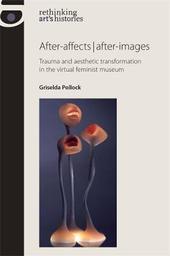
|
After-Affects | After-Images: Trauma and Aesthetic Transformation in the Virtual Feminist Museum
Paperback / softback
Main Details
| Title |
After-Affects | After-Images: Trauma and Aesthetic Transformation in the Virtual Feminist Museum
|
| Authors and Contributors |
By (author) Griselda Pollock
|
| Series | Rethinking Art's Histories |
|---|
| Physical Properties |
| Format:Paperback / softback | | Pages:416 | | Dimensions(mm): Height 234,Width 156 |
|
| Category/Genre | Art and design styles - from c 1900 to now |
|---|
| ISBN/Barcode |
9780719087981
|
| Classifications | Dewey:704.949155937 |
|---|
| Audience | | Professional & Vocational | |
|---|
| Illustrations |
Halftones, black & white|Illustrations, colour
|
|
Publishing Details |
| Publisher |
Manchester University Press
|
| Imprint |
Manchester University Press
|
| Publication Date |
31 August 2013 |
| Publication Country |
United Kingdom
|
Description
In closely-read case studies, we encounter artworks by Gian Lorenzo Bernini, Ana Mendieta, Louise Bourgeois, Alina Szapocznikow, Anna Maria Maiolino, Vera Frenkel, Sarah Kofman and Chantal Akerman to explore trauma and bereavement, fatal illness, Holocaust experience, migration, exile and the encounter with political horror and atrocity. -- .
Author Biography
Griselda Pollock is Professor of Social and Critical Histories of Art and Director of the Centre for Cultural Analysis, Theory and History at the University of Leeds. Author and editor of over 25 books and numerous articles on postcolonial, international feminist and cultural studies in the visual arts and film. With Catherine de Zegher, she co-edited Bracha L Ettinger: Art as Compassion (2011) and with Max Silverman Concentrationary Cinema: Aesthetics as Resistance in Alain Resnais's Night and Fog (2011) and Concentrationary Memories (2013). She is also editor of Visual Politics and Psychoanalysis: Art and the Image in Post-traumatic Culture (2013). Her forthcoming work includes a monograph on Charlotte Salomon's Life? Or Theatre? and Art in the Time-Space of Memory and Migration: Sigmund Freud, Anna Freud Bracha Ettinger in the Freud Museum -- .
ReviewsIn Griselda Pollock's brilliantly-staged encounters between contemporary art and psychoanalysis, the aesthetic emerges as the space in which we can be responsive to the traces of trauma and live with its after-effects. Through incisive and carefully-articulated theoretical insights and reparative acts of close reading, Pollock offers us new ways of thinking about painful aftermaths as well as a new vocabulary for feminist visual studies. Marianne Hirsch, William Peterfield Trent Professor of English and Comparative Literature in the Institute for Research on Women, Gender and Sexuality at Columbia University In this powerful latest book, Griselda Pollock brings her writing on her key concept of `the virtual feminist museum' to a new phase. What are the legacies of trauma in visual space? How might they be gendered? And is there a psychic realm to which women are closer that allows for a generative creativity equal to the horrors of our times? Once again, the meticulous, detailed respect she shows towards her chosen women artists is matched by a sustained theoretical scrutiny, both of which have become the hallmark of her unique feminist intervention into our understanding of images. Jacqueline Rose, Professor of English at Queen Mary, University of London -- .
|